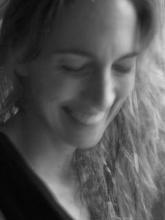
Writing the Unseen
How do we write about experience that ties us to something beyond our material lives, beyond what is empirically known and visible? Where do we find language for the light, love and connection that brings peace and even joy through our darkest moments? These are questions that poets Andrea Potos, Katrin Talbot and Rosemary Zurlo-Cuva have been exploring in their recent work, during dark periods of struggle and personal loss. Informed at times by the Romantics, by Rilke and Mary Oliver, these poems reach for a transcendant understanding of our connection to both this world and what comes after.
About Andrea Potos's A Stone to Carry Home
In this collection Andrea Potos exults in images of luminous earthly beauty -- a blue scarf lake, Greek bread that tastes of heaven and salt, cobbled streets shining like yet in the rain -- that also hint at the inevitability of loss. In these poems, Potos prepares to watch her daughter leave home and then takes us with her and the daughter on her journey to Greece and into the mountains of her ancestors, where eventually they arrive to the ruin that was once the home of her beloved grandfather. There is a sense of resilience in the talismans she evokes -- cut fresh lemons and olive oil, stars in the sky that light up the stones at night, and of course, the stones themselves -- that image by image bring past and the present together to offer a deep and expansive sense of home.
About Katrin Talbot's The Little Red Poem: A Dosage of Placebo Poetry
A poetry collection about what can ameliorate the amelioratable. This collection was dedicated to an amazing couple, dear dear friends, who were both struggling with horrific health issues and have since died within three months of each other.
About Rosemary Zurlo-Cuva's The Beauty of This World
The Beauty of This World transports us from the moody gray waters of Lake Michigan and the calming sunsets of Door County to harrowing Irish cliffs and the Wiltshire Dorset borders of England. These poems speak quietly and eloquently of the poet’s longings and early memories, grown vaguer, gauzy with time, whether telling family stories of an immigrant grandmother or the difficult birth of a daughter and the sweet curve of her moonlit cheek on a New Year’s Eve walk in the woods.Invoking Rilke, Zurlo-Cuva writes, the knowledge of impermanence haunts our days with its fragrance. The fragrances that linger from this wise collection are ones of sustenance and splendor.
Rosemary Zurlo-Cuva

Rosemary Zurlo-Cuva worked as a journalist, editor and writing teacher. She is the author of a poetry chapbook, The Beauty of This World (2014 Parallel Press) and a novel, Travel for Agoraphobics, published as an e-book in 2011. Rosemary divides her time between Madison and Seattle, and is at work on a new poetry collection, Face Turned to the Sun.
Katrin Talbot

Australian-born Katrin Talbot’s collection The Little Red Poem was recently released from dancing girl press. She has three other chapbooks, including noun’d, verb, from dancing girl press, Freeze-Dried Love from Finishing Line Press, and St. Cecilia’s Daze, published by Parallel Press. She has recently been nominated for two Pushcart Prizes in Poetry. Ms. Talbot is also a violist and photographer and her coffee table book, Schubert’s Winterreise-A Winter Journey in Poetry, Image, and Song is published by the University of Wisconsin Press and won a Best of the Best of University Presses.
Andrea Potos

Andrea Potos is the author of eight poetry collections, including A Stone to Carry Home (Salmon Poetry), Arrows of Light (Iris Press), An Ink Like Early Twilight (Salmon Poetry), We Lit the Lamps Ourselves (Salmon Poetry) and Yaya’s Cloth (Iris Press). The latter three books received Outstanding Achievement Awards in Poetry from the Wisconsin Library Association. Her poems can be found widely in print and online. She received the William Stafford Prize in Poetry from Rosebud Magazine, and the James Hearst Poetry Prize from the North American Review. A new collection of poems entitled Mothershell is in process.
